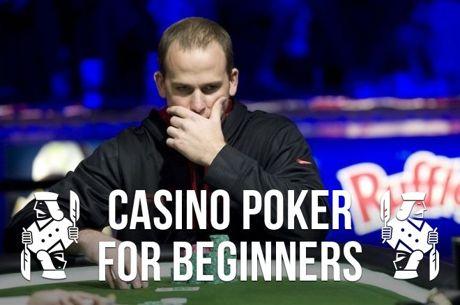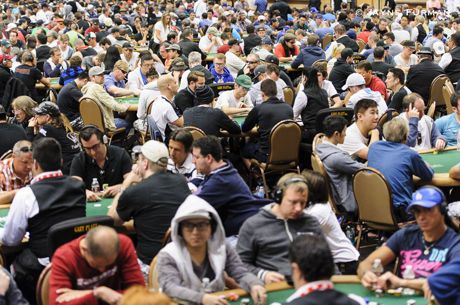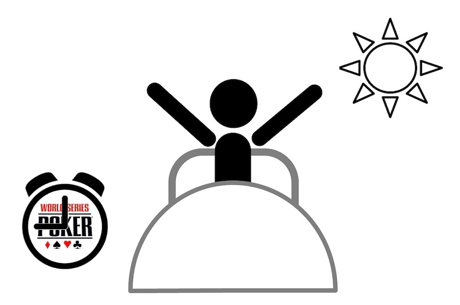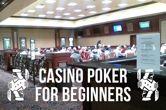A Brief Guide for Players New to Live Poker
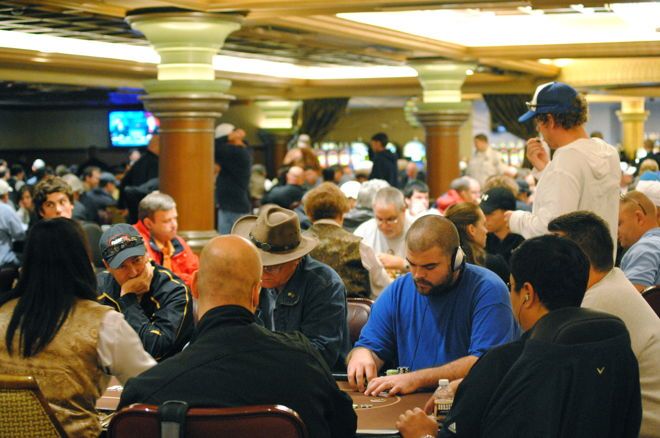
When you first decided to start dabbling with live poker, what were you thinking? After all, it had been way more comfortable playing on the internet. And, as an extra bonus, you could bark or do a victory dance unhindered at home.
Actually, a better question is "What took you so long to try live poker?"
Live poker is like a journey. You won't know how it really feels until you get there yourself. Watching videos, looking at photos, and hearing anecdotes are worth nothing when compared to the immediate, personal experience.
Of course, before the internet came to be live poker was the only option, and that was where the game earned its fame. The thrill of competition and everything else we've come to know of the game all started right there, in the cardroom.
Online poker has other perks, to be sure, but most of the time it is a string of fast hands, standard bets, and quick peeks at the numbers constantly being updated and displayed in one's HUD. On the other hand, in live poker there are added layers of socializing, live tells, and, most of all, the opportunity to scrutinize slowly all the details of a poker hand �� a luxury often missing from online play where situations come and go so quickly it can be hard to draw any meaningful lessons in real time.
In a nutshell, live poker has its own magic that can't be relayed by stories, but only felt directly, in the cardroom.
Let's suppose you are an online grinder who just stepped for the first time into a poker room in a casino or club, looking for some cash game action or a weekly tournament, much as many, many others have done before you. Or say you've just won a ticket to a live tournament via an online qualifier.
But there is a problem �� you don't know how to behave to avoid seeming out-of-step. Or conspicuous. Or weird, even. And let's say it aloud �� you are going to be a little weird in this environment if all you've done so far is to play online where the social side of things only involved an occasional "nh" typed into the chatbox.
To help those in this situation, we have assembled a list of simple, common sense tips to follow to help make your first live experience smooth and pleasant (and not weird at all).
1. Dress appropriately
When going to play poker in a "brick-and-mortar" cardroom, you are perfectly free just to throw on any old shirt and the shorts you wear when taking the dog for a walk. You can even wear flip-flops. After all, a poker tournament can be taken down in a jumpsuit �� who cares?
The fact is, a poker room can be a very favorable place for making new friends, so if you want this (and who doesn't?), just imagine you are out for a night in town and dress accordingly if you want to score social points in the process.
More important than the apparel itself is its state. It is essential for own comfort (not to mention that of others) for your clothes to be freshly cleaned. Many players won't be ever able to unsmell the times they had to play next to an opponent with bad hygiene. Sweat, body odor and dirt have no place in a poker room if you don't want people sighing in relief after you've left the premises, that invisible but pesky halo of smells following behind like a sort of comet of its own.
By the way, if playing a tournament that is being reported on, you might want to take special care of your fingernails, too, if you don't want shots of dirty, unkempt nails to turn up online. (Photographers can be merciless when showing off their hardware zooming capabilities.)
2. Pay attention and act in turn
If your image of a live poker professional includes hoodies, headphones, sunglasses and an ever-present mobile phone, you've been ill-informed. Those who barricade themselves behind disguising apparel and paraphernalia with a goal of hiding from others and keeping their live tells hidden are not the real pros. They are usually amateurs or aspiring players, some of whom might be mimicking the cryptic look of the "standard" poker player falsely illustrated in media.
The real professionals are those who pay attention at the table, watching their opponents' actions with the cards and chips (and otherwise). They are often also the ones laughing and chatting, as most of them know the health of the game means keeping the table happy and social.
Once you gather more experience, you'll find there are no peskier opponents than those who are oblivious when it is their turn in the hand. Their lack of attention when posting the blinds (and the ante, always the ante!) is frustrating for both the opponents and the dealer, as this kind of staller has this undesirable ability to turn any tournament structure into a hyper-turbo.
Paying attention obviously has practical benefits, too, beyond just helping you follow the action and know when and where to act. By staying alert you can pick up on opponents' tendencies, helping you decide how to play against them when in a hand. But above all, being attentive and otherwise communicative can help make the experience more pleasant for you and others.
3. Stack your chips so others can see and count them
No matter how tedious it may seem to you, it is generally recommended to keep your chips in stacks of 20, making it easier for everyone (dealer and opponents) to count them. Try to keep those stacks somewhat neat, too, if you can.
Also be sure to keep your higher denomination chips in front, thereby avoiding potential confusion when an opponent is trying to decide what to do and needs to know your stack size. (Not doing this can even be a subject to penalty.)
4. Don't touch food and then cards & chips
If you decide to eat at the table, don't touch the food with your bare hands. There is hardly anything more annoying for everyone than to see you transfer the grease from your French fries to your poker chips and cards.
Always be mindful of this, using a napkin and keeping your hands clean before handling chips or cards. (Even better, don't eat food with your hands at the table at all.)
5. Be friendly and lenient with the dealers
Dealers work hard and you are visiting their workplace. The last thing they need is to encounter unruly, nasty clients.
Players who blame dealers for coolers and bad beats especially deserve a big thumbs down. In terms of behavior at the table, that's about the lowest point to which a poker player can descend.
6. Don't discuss strategy at the table
It might seem tempting to do so, but don't recount bad beats and hand histories at the table, and above all don't criticize anyone's play.
Generally speaking, no one wants to hear about your bad luck or your musings about the intricacies of the game. Additionally, discussions about strategy will sometimes intimidate or even drive away recreational players who came to have fun, not to attend a poker academy.
7. Don't gloat when you win, or whine when you lose
A person's character is rarely better revealed than at the poker table. When you win a pot do so graciously, and when you lose show good sportsmanship.
When you lack compassion for the frustration of others while playing the absolute victim yourself, it denotes lack of empathy, making you the sort of player with whom no one enjoys playing. You will also end up alone with your drama during breaks because nobody wants to spend time with a selfish, inconsiderate grump.
8. Don't disturb active players engaged in a difficult game situation
When out of a hand, don't bother those still vying for a pot. When you face a hard decision yourself, you need silence to be able to concentrate fully. Be sure to provide the same courtesy to others.
9. Don't "Hollywood" unnecessarily
There are some players who strive to play like a very deliberate, slow-moving "machine." They meditate before each and every decision, no matter how trivial, as a way to suggest that their game is based on a whole apparatus of complex mathematical theories.
Of course, there are times when players may want to lure their opponents into a big pot by pretending to have a difficult decision. Otherwise, an excess of meditation during a hand unnecessarily slows down the game.
10. Don't flash your hole cards to your neighbors when you want to fold
This might be fine in a friendly home game, but in a cardroom don't try just showing your cards to your neighbor before tossing them into muck. It's not only against the rules, but also violates fair play, as all of your opponents should have equal access to the information you're providing.
Conclusion
Even though all these recommendations may seem like common sense, you would be amazed how many people ignore them, as well as a whole lot of other behaviors related to rules and etiquette not covered here.
The good news is that learning to follow these guidelines is (or should be) easier than learning how to play poker or the strategy needed to win. That's because all essentially stem from good courtesy �� the kind which we all are supposed to display in our social lives.
When you play live, be ready to compete against others, but also be ready to be "community-oriented" and help contribute in a positive way to the experience of everyone.

